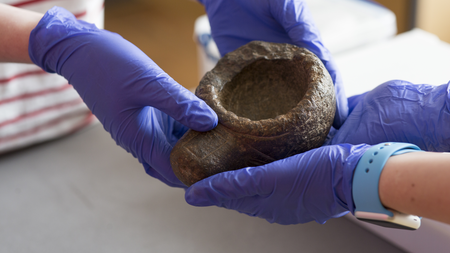
MA (Gotland), PhD (Durham), PgCert (LJMU)
Lecturer
- About
-
- Email Address
- linus.girdlandflink@abdn.ac.uk
- Telephone Number
- +44 (0)1224 273693
- Office Address
Room 201, Department of Archaeology, School of Geosciences
University of Aberdeen
St. Mary's, Elphinstone Road
AB24 3UF- School/Department
- School of Geosciences
Biography
Degrees
MA Osteology (Gotland University, Sweden) 2008
PhD Archaeogenetics (Durham University, UK) 2014
PGCert Learning and Teaching in Higher Education 2018 (Liverpool John Moores University)
Postdoc positions:
Natural History Museum (London, UK) 2012-2013
University of Aberdeen 2013-2016
Stockholm University 2015
Academic appointments
Lecturer & Senior Lecturer in Human Evolutionary Genetics (Liverpool John Moores University) 2016-2020
Lecturer in Biomolecular Archaeology (University of Aberdeen) 2020-present
To book a meeting click here.
Memberships and Affiliations
- Internal Memberships
-
Programme Director:
Director of studies:
Member of Geosciences Marketing Committee (UoA)
- External Memberships
- Research
-
Research Overview
I specialise in ancient DNA analysis and am particularly interested in animal domestication and past human demography. I also have a keen interest in wet-lab ancient DNA methods.
Research Areas
Accepting PhDs
I am currently accepting PhDs in Archaeology, Biological and Environmental Sciences.
Please get in touch if you would like to discuss your research ideas further.


Research Specialisms
- Genetics
- Archaeological Sciences
- Archaeology
Our research specialisms are based on the Higher Education Classification of Subjects (HECoS) which is HESA open data, published under the Creative Commons Attribution 4.0 International licence.
Current Research
Genome analysis of Early Medieval Picts of Scotland (via primary supervision of PhD student Adeline Morez at Liverpool John Moores University)
Assessing past biodiversity in Scotland and Ireland via environmental ancient DNA (NERC-funded QUADRAT PhD project at the University of Aberdeen)
Past mobility and migration in prehistoric Scotland (University of Aberdeen-funded PhD project in collaboration with Marischal Museum, Aberdeen, and the Crick Institute, London)
Supervision
My current supervision areas are: Archaeology, Biological and Environmental Sciences.
In addition to lead supervision at Aberdeen, I am lead supervisor for Miss Adeline Morez (Liverpool John Moores University)
- Teaching
-
Programmes
- Postgraduate, 3 semester, September start
I am programme coordinator
- Postgraduate, 3 semester, September start
I am programme coordinator
Courses
Course coordinator
Course coordinator
Course coordinator
Course coordinator
Course coordinator
Teaching Responsibilities
I teach a range of topics and on different courses, mainly linked to ancient biomolecules (and ancient DNA) and animal domestication. My teaching is a mix of lectures and tutorials (practicals, seminars, and workshops).
Non-course Teaching Responsibilities
Personal tutor
- Publications
-
Page 2 of 4 Results 11 to 20 of 33
Assessing the performance of quantity and quality metrics using the QIAGEN Investigator® Quantiplex® Pro RGQ kit
Science & Justice, vol. 60, no. 4, pp. 388-397Contributions to Journals: ArticlesDo dental nonmetric traits actually work as proxies for neutral genomic data?: Some answers from continental- and global-level analyses
American Journal of Physical Anthropology, vol. 172, no. 3, pp. 347-375Contributions to Journals: Articles- [ONLINE] DOI: https://doi.org/10.1002/ajpa.24052
- [OPEN ACCESS] http://aura.abdn.ac.uk/bitstreams/194065a4-a0a0-498b-ad79-b7533205a72e/download
- [ONLINE] View publication in Scopus
CoproID predicts the source of coprolites and paleofeces using microbiome composition and host DNA content
PeerJ, vol. 8, e9001Contributions to Journals: Articles- [ONLINE] DOI: https://doi.org/10.7717/peerj.9001/supp-1
- [OPEN ACCESS] http://aura.abdn.ac.uk/bitstreams/a84d3ddd-b413-4a61-bb64-ce3af7e5474c/download
- [ONLINE] View publication in Scopus
First farming in the north-western Mediterranean: evidence from Castellar-Pendimoun during the sixth millennium BCE
Farmers at the Frontier: A Pan European Perspective on Neolithisation. Gron, K. J., Sørensen, L., Rowley-Conwy, P. (eds.). Oxbow Books, pp. 145-159, 15 pagesChapters in Books, Reports and Conference Proceedings: Chapters (Peer-Reviewed)- [ONLINE] Link to the publisher website
Reply to dee and kuitems: Our model is an expression of the uncertainties inherent in the radiocarbon data
Proceedings of the National Academy of Sciences of the United States of America, vol. 116, no. 46, 22908Contributions to Journals: Letters- [ONLINE] DOI: https://doi.org/10.1073/pnas.1914993116
- [ONLINE] View publication in Scopus
Ancient pigs reveal a near-complete genomic turnover following their introduction to Europe
Proceedings of the National Academy of Sciences of the United States of America, vol. 116, no. 35, pp. 17231-17238Contributions to Journals: ArticlesNew horizons at L'Anse aux Meadows
Proceedings of the National Academy of Sciences of the United States of America, vol. 116, no. 31, pp. 15341-15343Contributions to Journals: Articles- [ONLINE] DOI: https://doi.org/10.1073/pnas.1907986116
- [OPEN ACCESS] http://aura.abdn.ac.uk/bitstreams/25b5caa4-4c03-4c8b-8c40-047f5d1937e2/download
- [ONLINE] View publication in Scopus
Megalithic tombs in western and northern Neolithic Europe were linked to a kindred society
PNAS, vol. 116, no. 19, pp. 9469-9474Contributions to Journals: Articles- [ONLINE] http://www.pnas.org/lookup/suppl/doi:10.1073/pnas.1818037116/-/DCSupplemental
- [ONLINE] DOI: https://doi.org/10.1073/pnas.1818037116
- [OPEN ACCESS] http://aura.abdn.ac.uk/bitstreams/b71a6a2e-bc2b-42cc-8a8b-934996934269/download
- [ONLINE] View publication in Mendeley
- [ONLINE] https://abdn.pure.elsevier.com/en/en/researchoutput/megalithic-tombs-in-western-and-northern-neolithic-europe-were-linked-to-a-kindred-society(e2a2bcfc-2da7-41ee-abe9-61e7f2957164).html
Elucidating recent history by tracing genetic affinity of three 16th century miners from Sweden
Journal of Archaeological Science: Reports, vol. 19, pp. 651-657Contributions to Journals: Articles- [ONLINE] DOI: https://doi.org/10.1016/j.jasrep.2018.03.035
- [ONLINE] View publication in Scopus
Genetic insight into an extinct population of asian elephants (Elephas maximus) in the near east
Open Quaternary, vol. 4, pp. 1-9Contributions to Journals: Articles- [ONLINE] DOI: https://doi.org/10.5334/oq.36
- [OPEN ACCESS] http://aura.abdn.ac.uk/bitstreams/a3870774-da8d-47fc-9288-19e6420a2a32/download
- [ONLINE] View publication in Scopus
